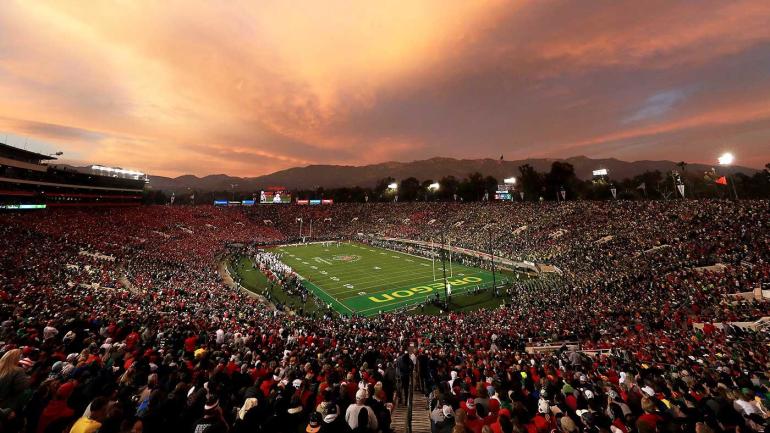
The Rose Bowl has signed an agreement with the College Football Playoff that paves the way for the event to expand to 12 teams starting in 2024, sources confirm to CBS Sports. The CFP had given the Rose Bowl until the end of the week -- at the latest -- to agree to terms the bowl had thus far been unwilling to accept.
With the Rose Bowl now in the fold, a formal announcement of a 12-team playoff being held in 2024 and 2025 is expected imminently. The new format was initially agreed upon by the CFP Board of Managers in September.
Though the terms of the agreement signed by the Rose Bowl are not yet known, the bowl had been demanding to play its game in its traditional time slot at 5 p.m. ET on Jan. 1 despite playoff expansion potentially affecting the bowl schedule. That time slot is considered one of the most valuable in sports television. The agreement signed by the Rose Bowl likely creates significantly more flexibility in that scheduling process.
In an expanded playoff, the games themselves are more important than the bowls that host the contests. The Rose Bowl refusing to acquiesce to a more uniform scheduling policy would have delayed expansion until 2026 after the CFP's current contract with ESPN ends. That would have cost involved parties an estimated $450 million in added revenue, and it may have kept the Rose Bowl out of the selection process once a new contract was signed.
The Rose Bowl had proposed hosting CFP quarterfinals in 2024 and 2025 -- possibly without their traditional Big Ten and Pac-12 partners -- in exchange for keeping its time slot as part of the CFP's new media rights contract starting in 2026, a source close to the situation told CBS Sports. That offer was refused.
Asked what leverage the Rose Bowl had in the process, a person involved in the CFP process simply replied, "They have none." One CFP bowl official said early expansion would have been impossible after this weekend's conference championship games amid the rush of bowl and playoff season.
The CFP is in the ninth year of a 12-year deal with ESPN that expires after the 2025 season. All necessary parties other than the Rose Bowl had already agreed to expand to 12 teams for the 2024 and 2025 seasons. The 10 FBS conferences, Notre Dame and the participating New Year's Six bowls agreed on such issues as playing at campus sites, dates of games and revenue distribution for early expansion. However, the agreement to expand early needed to be unanimous.
Over the years, every BCS/CFP scheduling decision -- until now -- has accommodated the Rose Bowl being able to broadcast its game at its preferred time slot 5 p.m. time slot on or around New Year's Day. The game has traditionally been scheduled to follow the Tournament of Roses of Parade. The timing was such that the sun would always set in the West over the San Gabriel Mountains during the game, thus creating one of the most iconic settings in American sports.
With the CFP ready to expand, its handlers became less tolerant of meeting the Rose Bowl's demands. That 5 p.m. time slot will be too valuable in the future when -- for the first time -- the feeling is that the games are more important than the bowl sites.
"It's the equivalent of Super Bowl Sunday," said one industry source of the 5 p.m. time slot. "New Year's Day is kind of like a Sunday, even if it's not on a Sunday. Everybody is hung over from New Year's Eve. They're sitting back, it's 5 o'clock. Everybody is done with what they need to do. It is the best window that there is."
The primary reasons to expand early are to provide more playoff access to teams and score an extra $450 million per year from rightsholder ESPN so it could air the additional CFP games in 2024 and 2025. A new media rights contract will need to be signed for 2026 and beyond.
It was not clear what leverage the Rose Bowl believed it held in the negotiations. That broadcast window is valuable, and CFP stakeholders were fed up with accommodating the Rose Bowl in an arrangement that goes back almost a quarter century.
The Rose Bowl began to give up its exclusivity in 1998, the first year of the BCS. Back then, it agreed to end a continuous run of featuring the Big Ten and Pac-12 champions that dated back to 1947. In the BCS agreement, the Rose Bowl surrendered its two spots once every four years in a rotation to host the BCS Championship Game. That first occurred after the 2001 season when Miami defeated Nebraska for its last national title. Both schools at the time mentioned how they were meant to feel like outsiders after 55 consecutive years of Big Ten vs. Pac-8/10 matchups.
When the CFP began in 2014, it was assured the Rose Bowl would never host a national championship. Los Angeles was building the new SoFi Stadium, and the city of Pasadena didn't have the means to outbid the city of L.A. SoFi will host the 2023 CFP National Championship. Meanwhile, since 2014, the Rose Bowl has hosted CFP semifinals in 2015, 2018 and 2021.
"The luster of that game goes away [if the Rose doesn't agree]," said one bowl executive outside the CFP system. Maybe the Rose Bowl just has to give in, suck it up. It's just who blinks first."
On Wednesday night, the Rose Bowl blinked.
Bagikan Berita Ini














0 Response to "Rose Bowl agreement clears way for College Football Playoff's 12-team expansion in 2024 and 2025 - CBS Sports"
Post a Comment